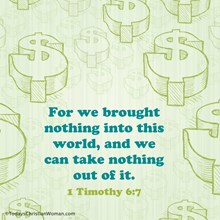Did it really make a difference? Did it really change lives? These are some of the questions that drove me to Africa last summer as I travelled with World Vision to see with my own eyes whether running three Chicago Marathons to raise money for clean water in Kenya had been worth it. I felt the burning need to verify whether my time and effort both in training and fundraising had made a difference. Plus, I wanted to be sure I could confidently tell people who had donated to this cause on my behalf that their financial sacrifice had been well-stewarded.
As I type these words now, I'm uncomfortably aware of another motivation that was driving me: stinginess. What I really wanted to know was whether I should keep giving away my time and money to people I would probably never meet. Running for clean water had cost me a lot, not the least of which was precious time away from my family during the long and intense training seasons.
But God had other answers—and other questions—in mind for me. During our African tour, our group attended a local church. It just so happened that on that particular Sunday, three or four other congregations also joined for worship at this church. Apparently, the pastor needed a new roof on his house, so these neighboring congregations banded together at his church in part to take up a collection to help fund his roof.
To see local churches coming together to help provide for another pastor's personal needs was moving. Would this happen in my community where churches seem to compete more than collaborate? I wondered. I could feel my heart (and purse) strings loosening up. And then the pastor who needed the new roof preached from Luke 21: "While Jesus was in the Temple, he watched the rich people dropping their gifts in the collection box. Then a poor widow came by and dropped in two small coins. 'I tell you the truth,' Jesus said, 'this poor widow has given more than all the rest of them. For they have given a tiny part of their surplus, but she, poor as she is, has given everything she has'" (verses 1–4).
These verses are reassuring to anyone who feels they have so little to give. God loves a cheerful giver, after all, even when the gift seems like a pittance. Giving to God isn't about the amount so much as the motivation prompting it. I watched as these destitute Kenyans generously dropped the little they had into the offering basket.
While my husband and I have never lived in conditions like the people I met in Kenya, at various points in our marriage, we have struggled to make ends meet. I confess I have a hard time keeping my hands open in those seasons. I don't always trust that God's riches, whether seemingly plenty or not, can flow through me and bless others. Instead, I sometimes hoard the little I have in fear that I may not receive more. Even knowing God sent manna from heaven as an object lesson on this point doesn't chase away my fear during meager seasons.
But hearing this Kenyan pastor preach on the widow's mite opened my eyes to an even deeper realization: The thing I hoard and hide away most in my life isn't my money, it's my weakness. It's my personal poverty. While the apostle Paul celebrated his weakness, I often try as hard as I can to hide mine. Appearing self-sufficient is so much more comfortable than admitting you're not good at everything. Of course, this is a slippery slope to pride, and what is pride but a hoarding and hiding away of our fears and weaknesses.
If I thought parting with a few dollars for the pastor's roof collection was tough, trying to give my weaknesses to God that day felt like prying my fingers loose from my most protected possession—my pride. I started to identify areas in my life where I wanted to be able to give all I have and yet I'm so desperately wanting—in lavishing others with love, in being a wife and mother, in honoring God through my work, the list goes on. It felt like God was whispering to me, Thanks for giving out of your poverty. This is the gift I've been waiting for. I can make much of this.
During my trip to Africa, I saw the amazing results of raising money for World Vision through marathon running—I saw water projects that bring health and ministries that bring wholeness. And since the conviction I received that day in a Kenyan church, I also experienced a newfound freedom and strength, like Paul who wrote, "For when I am weak, then I am strong" (2 Corinthians 12:10). For me, giving out of my poverty of soul is harder than giving from my pocketbook. Now, whenever I feel myself clenching tightly to a personal struggle (for example, feeling inept in my work, or not knowing how to restore a broken relationship), I envision dropping that fear or weakness into an offering basket and saying, "God, this isn't much, but it's all I've got. I want to do well at work or be in harmony with so-and-so again. Will you take my intention and desire, which is all I have to offer right now, and magnify it into something that gives you glory?"
In taking a lesson from the widow and giving the mites of my life to God, I'm growing richer day by day. In this issue, we're taking a look at what it means to be rich and poor and what we do with the wealth we've been given. Jen Pollock Michel reflects honestly about how even those who prosper financially have money problems. Amy Julia Becker, Christianity Today's newest blogger (see Thin Places), takes a look at how we are to steward our money. Is it more godly to enjoy wealth or to give it all away? There's not a one-size-fits-all answer, but Amy Julia offers some principles to help guide our decision-making process.
Finally, for anyone who's ever struggled financially, Caryn Rivadeneira, author of the forthcoming book Broke (IVP, April 2014), offers a fresh perspective on wealth in her article, "An Embarrassment of Riches." It turns out we're all richer than we can imagine.
Richly blessed,
Marian V. Liautaud
Editor
Follow me @MarianLiautaud and @TCWomancom
Subscribe to TCW at this link, and sign up for our free e-newsletter to become part of a community of women striving to love God and live fearlessly in the grit of everyday life.
Read more articles that highlight writing by Christian women at ChristianityToday.com/Women
 Read These Next
Read These Next


 Do You $pend Too Much on Your Kids?Many of us do, says expert (and mom) Juliet Schor. Here's how to keep things in perspective
Do You $pend Too Much on Your Kids?Many of us do, says expert (and mom) Juliet Schor. Here's how to keep things in perspective









 Homepage
Homepage
